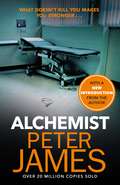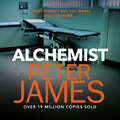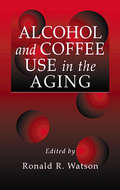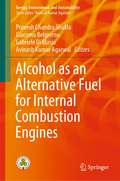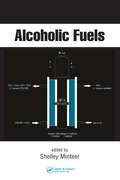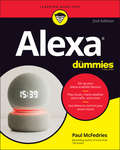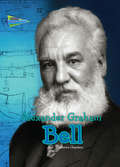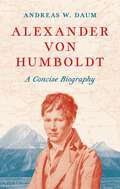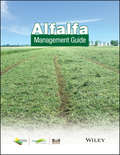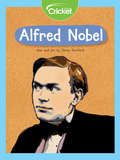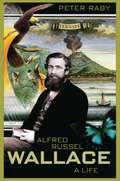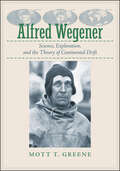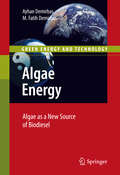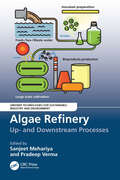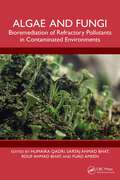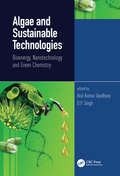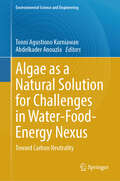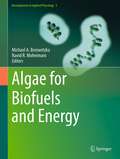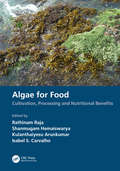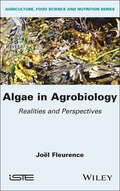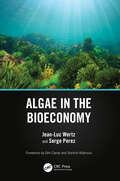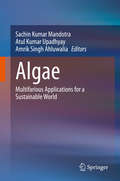- Table View
- List View
Alcatraz: History and Design of a Landmark
by Ira Nadel Donald MacDonaldThis illustrated volume by the authors of Golden Gate Bridge explores the history and design of San Francisco’s infamous island prison.Award-winning architect Donald MacDonald and acclaimed author Ira Nadel present the first complete history of Alcatraz told through its architecture. In friendly illustrations and accessible text, Alcatraz reveal the design decisions that have shaped the island from its first brick and masonry fortress to the infamous concrete cellblock, to the landscape design of its contemporary gardens and bird sanctuaries.Packed with intriguing facts throughout, this little treasure allows an unprecedented glimpse into the life of the island. It is an entertaining look at one of the nation’s most visited destinations.
Alchemist
by Peter JamesWhat doesn't kill you makes you stronger...Monty Bannerman's father is a leading genetic scientist, and Nobel Prize winner, whose company has just been taken over by what will soon be the world's biggest pharmaceutical giant. He had some misgivings about their company ethics - but ultimately, he needs their money, and they need his mind. Then a journalist comes to Monty's door, with a far-fetched story about the pharmaceutical company. She doesn't believe what she's being told for a moment - but within a few short weeks, events are making the apparently fantastic claims look horrifyingly like the truth.Behind the respectable facade of the multi-national company which calls itself the 'World's Most Caring Company' lies an outrage against the whole human race...'Peter James is getting better with every book.' Times'Peter James is one of the best crime writers in the business.' Karin SlaughterRead more from the multi-million copy bestselling author of the Roy Grace novels:Possession DreamerSweet Heart Twilight Prophecy Host Alchemist Denial The Truth Faith * Each Peter James novel can be read as a standalone*
Alchemist
by Peter JamesWhat doesn't kill you makes you stronger...Monty Bannerman's father is a leading genetic scientist, and Nobel Prize winner, whose company has just been taken over by what will soon be the world's biggest pharmaceutical giant. He had some misgivings about their company ethics - but ultimately, he needs their money, and they need his mind. Then a journalist comes to Monty's door, with a far-fetched story about the pharmaceutical company. She doesn't believe what she's being told for a moment - but within a few short weeks, events are making the apparently fantastic claims look horrifyingly like the truth.Behind the respectable facade of the multi-national company which calls itself the 'World's Most Caring Company' lies an outrage against the whole human race...'Peter James is getting better with every book.' Times'Peter James is one of the best crime writers in the business.' Karin SlaughterRead more from the multi-million copy bestselling author of the Roy Grace novels:Possession DreamerSweet Heart Twilight Prophecy Host Alchemist Denial The Truth Faith * Each Peter James novel can be read as a standalone*
Alchemist
by Peter JamesWhat doesn't kill you makes you stronger...Monty Bannerman's father is a leading genetic scientist, and Nobel Prize winner, whose company has just been taken over by what will soon be the world's biggest pharmaceutical giant. He had some misgivings about their company ethics - but ultimately, he needs their money, and they need his mind. Then a journalist comes to Monty's door, with a far-fetched story about the pharmaceutical company. She doesn't believe what she's being told for a moment - but within a few short weeks, events are making the apparently fantastic claims look horrifyingly like the truth.Behind the respectable facade of the multi-national company which calls itself the 'World's Most Caring Company' lies an outrage against the whole human race...'Peter James is getting better with every book.' Times'Peter James is one of the best crime writers in the business.' Karin SlaughterRead more from the multi-million copy bestselling author of the Roy Grace novels:Possession DreamerSweet Heart Twilight Prophecy Host Alchemist Denial The Truth Faith * Each Peter James novel can be read as a standalone*
Alcohol and Coffee Use in the Aging
by Ronald R. WatsonAs we age, our physiology changes. Also, we tend to place less emphasis on proper nutrition. The more elderly we grow, the less resistant we become to major diseases such as cancer and heart disease. This state of affairs renders the elderly more vulnerable to alcohol and other drugs of abuse. Alcohol and tobacco are routinely used together. Chroni
Alcohol as an Alternative Fuel for Internal Combustion Engines (Energy, Environment, and Sustainability)
by Avinash Kumar Agarwal Pravesh Chandra Shukla Giacomo Belgiorno Gabriele Di BlasioThis book covers different aspects related to utilization of alcohol fuels in internal combustion (IC) engines with a focus on combustion, performance and emission investigations. The focal point of this book is to present engine combustion, performance and emission characteristics of IC engines fueled by alcohol blended fuels such as methanol, ethanol and butanol. The contents also highlight the importance of alcohol fuel for reducing emission levels. Possibility of alcohol fuels for marine applications has also been discussed. This book is a useful guide for researchers, academics and scientists.^
Alcoholic Fuels
by Shelley MinteerScientists and engineers have made significant advances over the last two decades to achieve feasible, cost-efficient processes for the large-scale production of alternative, environmentally friendly sources of energy. Alcoholic Fuels describes the latest methods for producing fuels containing varying percentages of alcohol alongside the var
Alexa For Dummies
by Paul McFedriesIs there an Echo® in here? Alexa is the voice-controlled Amazon service that transforms your home-sweet-home into a smart home. And Alexa For Dummies is the companion guide that will help you figure out which Echo® device is right for you so you can start training Alexa to be your personal assistant-extraordinaire. This book shows you how to make the most of everything Alexa can do—and that’s a lot! Whether you simply want to play audio or you’re ready to explore Alexa’s higher-level capabilities, we’ve got you covered. Inside... Personalize your Echo® device Enhance security and privacy Ask questions Alexa understands Discover Alexa’s accessibility features Make lists and send texts Set up smart home Wi-Fi Automate your home with routines Install new Alexa skills
Alexander Graham Bell Answers the Call
by Mary Ann FraserWell before Alexander Graham Bell invented the telephone, Aleck (as his family called him) was a curious boy, interested in how and why he was able to hear the world all around him. His father was a speech therapist who invented the Visible Alphabet and his mother was hearing impaired, which only made Aleck even more fascinated by sound vibration and modes of communication. Naturally inquisitive and inclined to test his knowledge, young Aleck was the perfect person to grow up in the Age of Invention. As a kid he toyed with sound vibrations and began a life of inventing. This in-depth look at the life and inspiration of the brilliant man who invented the tele-phone is sure to fire up the imaginations of young readers who question why and how things work. Driven by curiosity and an eagerness to help others, Aleck became a teacher for the deaf. His eventual invention of the telephone proved that he never stopped thinking big or experimenting with sound.Backmatter includes more information about Bell&’s inventions, a timeline of his life, a bibliography, and sources for further learning.
Alexander von Humboldt: A Concise Biography
by Andreas W. DaumAn engaging account of the life and work of the legendary polymath Alexander von HumboldtIn this lucid biography, Andreas Daum offers a succinct and novel interpretation of the life and oeuvre of Alexander von Humboldt (1769―1859). A Prussian nobleman born into the age of European Enlightenment, Humboldt was a contemporary of Napoleon, Simón Bolívar, and Charles Darwin. As a naturalist and scholar, he traveled the world, from the Americas to Central Asia, and recorded his observations in multiple volumes. Humboldt is still admired today for his interdisciplinary outreach and ecological awareness.Moving beyond the conventional views of Humboldt as either intellectual superhero or gentleman colonizer, Daum&’s incisive account focuses on Humboldt in the context of the tumultuous period of history in which he lived. Humboldt embodied the contradictions that marked the age of Atlantic Revolutions. He became a critic of slavery and embraced the emerging civil society but remained close to authoritarian rulers. He dedicated his life to scientific research yet was driven by emotional impulses and pleaded for an aesthetic appreciation of nature. Daum introduces a man passionately striving to establish a &“cosmic&” understanding of nature while grappling with the era&’s explosion of knowledge.This book provides the first concise biography of Humboldt, covering all periods of his life, exploring his personality, the vast range of his works, and his intellectual networks. Daum helps us understand Humboldt as a seminal historical figure and illuminates the role of science at the dawn of the global world.
Alfalfa Management Guide (ASA, CSSA, and SSSA Books #152)
by Dan Undersander Mark Renz Craig Sheaffer Glen Shewmaker Mark SulcLearn how to achieve top yields to maximize profits. This 2011 edition offers the latest information and strategies for alfalfa establishment, production, and harvest. Includes many color photos and charts.
Alfred Nobel
by James RumfordDid you know the Nobel Prize is named after the man who invented dynamite? Learn all about the life of Alfred Nobel, who grew up in a desperately poor family.
Alfred Russel Wallace: A Life
by Peter RabyIn 1858, Alfred Russel Wallace, aged thirty-five, weak with malaria, isolated in the Spice Islands, wrote to Charles Darwin: he had, he said excitedly, worked out a theory of natural selection. Darwin was aghast--his work of decades was about to be scooped. Within two weeks, his outline and Wallace's paper were presented jointly in London. A year later, with Wallace still on the opposite side of the globe, Darwin published On the Origin of Species. This new biography of Wallace traces the development of one of the most remarkable scientific travelers, naturalists, and thinkers of the nineteenth century. With vigor and sensitivity, Peter Raby reveals his subject as a courageous, unconventional explorer and a man of exceptional humanity. He draws more extensively on Wallace's correspondence than has any previous biographer and offers a revealing yet balanced account of the relationship between Wallace and Darwin. Wallace lacked Darwin's advantages. A largely self-educated native of Wales, he spent four years in the Amazon in his mid-twenties collecting specimens for museums and wealthy patrons, only to lose his finds in a shipboard fire in the mid-Atlantic. He vowed never to travel again. Yet two years later he was off to the East Indies on a vast eight-year trek; here he discovered countless species and identified the point of divide between Asian and Australian fauna, 'Wallace's Line.' After his return, he plunged into numerous controversies and published regularly until his death at the age of ninety, in 1913. He penned a classic volume on his travels, founded the discipline of biogeography, promoted natural selection, and produced a distinctive account of mind and consciousness in man. Sensitive and self-effacing, he was an ardent socialist--and spiritualist. Wallace is one of the neglected giants of the history of science and ideas. This stirring biography--the first for many years--puts him back at center stage, where he belongs.
Alfred Wegener: Science, Exploration, and the Theory of Continental Drift
by Mott T. GreeneA masterful biography of Alfred Wegener (1880–1930), the German scientist who discovered continental drift.Winner of the CHOICE Outstanding Academic Title of the Choice ACRLAlfred Wegener aimed to create a revolution in science which would rank with those of Nicolaus Copernicus and Charles Darwin. After completing his doctoral studies in astronomy at the University of Berlin, Wegener found himself drawn not to observatory science but to rugged fieldwork, which allowed him to cross into a variety of disciplines. The author of the theory of continental drift—the direct ancestor of the modern theory of plate tectonics and one of the key scientific concepts of the past century—Wegener also made major contributions to geology, geophysics, astronomy, geodesy, atmospheric physics, meteorology, and glaciology. Remarkably, he completed this pathbreaking work while grappling variously with financial difficulty, war, economic depression, scientific isolation, illness, and injury. He ultimately died of overexertion on a journey to probe the Greenland icecap and calculate its rate of drift. This landmark biography—the only complete account of the scientist’s fascinating life and work—is the culmination of more than twenty years of intensive research. In Alfred Wegener, Mott T. Greene places Wegener’s upbringing and theoretical advances in earth science in the context of his brilliantly eclectic career, bringing Wegener to life by analyzing his published scientific work, delving into all of his surviving letters and journals, and tracing both his passionate commitment to science and his thrilling experiences as a polar explorer, a military officer during World War I, and a world-record–setting balloonist. In the course of writing this book, Greene traveled to every place that Alfred Wegener lived and worked—to Berlin, rural Brandenburg, Marburg, Hamburg, and Heidelberg in Germany; to Innsbruck and Graz in Austria; and onto the Greenland icecap. He also pored over archives in Copenhagen, Munich, Marburg, Graz, and Bremerhaven, where the majority of Wegener’s surviving papers are found. Written with great immediacy and descriptive power, Alfred Wegener is a powerful portrait of the scientist who pioneered the modern concept of unified Earth science. The book should be of interest not only to earth scientists, students of polar travel and exploration, and historians but to all readers who are fascinated by the great minds of science.
Algae Energy: Algae as a New Source of Biodiesel (Green Energy and Technology)
by Muhammet Fatih Demirbas Ayhan DemirbasAlgae Energy covers the production of algae culture and the usage of algal biomass conversion products. It also reviews modern biomass-based transportation fuels, including biodiesel, bio-oil, biomethane and biohydrogen. Each chapter opens with fundamental explanations suitable for those with a general interest in algae energy and goes on to provide in-depth scientific details for more expert readers. Algae energy is discussed within the wider context of green energy, with chapters covering topics such as: green energy facilities, algae technology, energy from algae and biodiesel from algae. Algae Energy addresses the needs of energy researchers, chemical engineers, fuel and environmental engineers, postgraduate and advanced undergraduate students, and others interested in a practical tool for pursuing their interest in bio-energy.
Algae Refinery: Up- and Downstream Processes (Greener Technologies For Sustainable Industry And Environment)
by Pradeep Verma Sanjeet MehariyaAlgae Refinery: Up- and Downstream Processes offers complete coverage of algae refinery, including up- and downstream processes while proposing an integrated algal refinery for the advancement of existing technologies and summarizing the strategies and future perspectives of algal refinery. It provides a concise introduction to the algal science, biology, technology, and application of algae. It explains downstream and upstream steps of algal refinery for the production of algal biomass, with several social benefits. Features: Provides various aspects of algal bioprocess including upstream and downstream processes Explains the major research streams of algae structures and their pathways Covers algal-based CO2 capture technology Explores the potential applications of algae for socioeconomical benefits Deliberates algal bioremediation approach for clean and sustainable development
Algae and Fungi: Bioremediation of Refractory Pollutants in Contaminated Environments
by Humaira Qadri Rouf Ahmad Bhat Sartaj Ahmad Bhat Fuad AmeenThis book discusses algae and fungi as the tools for decontamination of polluted environments and how the remediation techniques aid in biorefining the pollution in environmentally sustainable ways. It covers their applications in containing and controlling pollution along with detailed diagrammatic representations including mechanisms of phyco- and myco-remediation. Recovery of pollutants including heavy metals, pesticides, organic chemicals, radionuclides, and persistent chemicals from polluted ecosystems and wastewater is also covered. Exclusively covers phyco- and myco-remediation of various pollutants Reviews dynamics of pollution abatement related to algae as well as fungi Covers recovery of the pollutants from polluted ecosystems Advocates usage of multiple modes of fungi and algae for detoxification of different compounds Discusses restoration of the degraded ecosystems This book is aimed at researchers and graduate students in environmental engineering, algae and fungi biotechnology, applied microbiology, and phycology.
Algae and Sustainable Technologies: Bioenergy, Nanotechnology and Green Chemistry
by Atul Kumar Upadhyay D. P. SinghAlgal and sustainable technologies: Bioenergy, Nannotechnology and Green chemistry is an interdisciplinary overview of the world’s major problems; water scarcity, clean environment and energy and their sustenance remedy measures using microalgae. It comprehensively presents the way to tackle the socio-economic issues including food, feed, fuel, medicine and health and also entails the untapped potential of microalgae in environmental management, bioenergy solution and sustainable synthesis of pharmaceutical and nutraceutical products. This book basically emphasizes the success of algae as wonderful feed stocks of future and provides upto date information and sustainable and recreational outlook towards degrading environment and energy crisis. Applicability of fast emerging algae based nanotechnology in bioremediation and production of nanoparticle (AuNP, AgNP etc) are beautifully described along with latest research and findings. Key features: The "waste to best to income" strategies are the main concern of the book and take the edge off the problem of pollution, energy and income. Elucidate the sustainable phycoremediation and nanoparticle functions as low cost approach for various ecosystem services. Information regarding pharmaceuticals, nutraceuticals and other algae based value added product synthesis and fate are comprehensively discussed. Knowledge resource, latest research, findings and prospects presented in an accessible manner for researchers, students, eminent scientists, entrepreneurs, professionals and policy maker.
Algae as a Natural Solution for Challenges in Water-Food-Energy Nexus: Toward Carbon Neutrality (Environmental Science and Engineering)
by Abdelkader Anouzla Tonni Agustiono KurniawanThis book provides an overview of challenges and opportunities for algal management to mitigate climate change. This book offers new perspectives on how to control water pollution due to algae, while converting it to biosorbent and biodiesel that could be sold in market. The work also explores how to improve the performance of algae for such purposes. By identifying existing knowledge gap, this work uncovers new research directions for further development of algal management to address global environmental pollution. • Extensive literature survey (2001-2023) in algal management based on empirical approach in the body of knowledge • A comprehensive overview with critical analysis of algal management, for water treatment, biodiesel production, and food production, while dealing with climate change • Providing insights about challenges, research direction, outlook, and perspectives of algal management in Industry 4.0 era This book has an advantage that each chapter will be written by experts around the world working in their respective fields. As a result, this volume presents a balanced picture across the whole spectrum of algae. Furthermore, the authors are from both the developing and developed countries thus giving a worldwide perspective of looming climatic problems.
Algae for Biofuels and Energy (Developments in Applied Phycology #5)
by Navid R. Moheimani Michael A. BorowitzkaMicroalgae are one of the most studied potential sources of biofuels and bioenergy. This book covers the key steps in the production of renewable biofuels from microalgae - strain selection, culture systems, inorganic carbon utilisation, lipid metabolism and quality, hydrogen production, genetic engineering, biomass harvesting, extraction. Greenhouse gas and techno-economic modelling are reviewed as is the 100 year history of microalgae as sources of biofuels and of commercial-scale microalgae culture. A summary of relevant basic standard methods used in the study of microalgae culture is provided. The book is intended for the expert and those starting work in the field.
Algae for Food: Cultivation, Processing and Nutritional Benefits
by Shanmugam Hemaiswarya Rathinam Raja Kulanthaiyesu Arunkumar Isabel S. CarvalhoAlgae for Food: Cultivation, Processing and Nutritional Benefits Algae are a primitive, living photosynthetic form and they are the oldest living organism. In the marine ecosystem, algae are the primary producers that supply energy required to a diverse marine organism and especially seaweed provides a habitat for invertebrates and fishes. There have been significant advances in many areas of phycology. This book describes the advances related to food and nutrition of algae achieved during the last decades, it also identifies gaps in the present knowledge and needs for the future. The 17 chapters, grouped into 6 parts, are written by phycologists. More insight on industrial exploitation of algae and their products is supported by current studies and will help academia. The first part explains new technologies to improve the microalgal biomass, strain improvement and different methods of seaweed cultivation. In the second part, food and nutraceutical applications of algae, food safety aspects, green nanotechnology and formulation methods for the extraction and isolation of algal functional foods are described. The third part deals with pigments and carotenoids while the fourth part exploits the isolation and application of hydrocolloids, nutritional implications of algal polysaccharides and the characterization and bioactivity of fucoidans. In the fifth part, the biomedical potential of seaweed followed by agricultural applications of algae are well described. The book is an important resource for scholars that provides knowledge on wide range of topics. Key Features Covers important fields of algae from biomass production to genetic engineering aspects of algae Useful in the field of algal biotechnology, aquaculture, marine micro and macrobiology, microbial biotechnology and bioprocess technology Focuses on the therapeutic and nutritional areas of algae
Algae in Agrobiology: Realities and Perspectives
by Joel FleurenceAlgae, macroalgae and microalgae can be valuable biological resources in a new, more environmentally friendly form of agriculture known as agrobiology. Indeed, the biological properties associated with algae are frequently relevant for agricultural and zootechnical purposes. It is this aspect that is behind the current popularity of algae in the development of new agricultural practices that are related to plant and animal production, which are referred to as agrobiology. Algae in Agrobiology offers a current and forward-looking account of algae use: in agriculture and in the sector of land and marine animal production, as algal extracts and molecules in the form of fertilizers or biostimulants for crops with agronomic interest, and as algal compounds in the area of plant and animal health. This book is based on advances in biochemical and agronomic research in order to explain the conventional practices associated with the use of algae in agriculture and livestock breeding. These advances make it possible to establish possible uses for marine algal resources in the agriculture of the future.
Algae in the Bioeconomy
by Jean-Luc Wertz Serge PerezAlgae play an important ecological role as oxygen producers and carbon sequesters and are the food base for all aquatic life. Algae are economically important as a source of crude oil, food and feed, and pharmaceutical and industrial products. High-value and sustainable products from algae are already economically viable and can be a fundamental driver for fuel production. Algae in the Bioeconomy provides a detailed overview of the chemical composition of algae and shows that an integrated biorefinery approach is necessary for large-scale algae production and conversion, where multiple products are produced. This book serves as a unique compendium of knowledge covering the essential features of algae and their applications. Discusses the structural chemistry and biology of micro- and macroalgal components Describes classification, occurrence, conversion, and production of micro- and macroalgae Offers strategies for optimal use of micro- and macroalgae in the bioeconomy, including regional strategies in the EU, US, China, India, Malaysia, Norway, and Chile Features forewords from international experts offering both a scientific and an economic/strategic viewpoint This book is intended for an interdisciplinary audience in chemical engineering, biotechnology, and environmental science and engineering, promoting research, development, and application of algae as a sustainable resource.
Algae: Multifarious Applications for a Sustainable World
by Atul Kumar Upadhyay Sachin Kumar Mandotra Amrik Singh AhluwaliaThis exciting book presents diverse applications of microalgal renewable resources to meet modern demands for energy and value-added products. It also comprehensively describes the role of algae in sustainable and cost-effective wastewater treatment strategies, and highlights the latest research on, advances in and biotechnological relevance of algae in the areas of bioenergy, bioremediation, pharmaceuticals, nutraceuticals and green economy. The book addresses gaps in the fields of bioenergy, waste management, health and economy by providing broad information on bioenergy production, management strategies, drug development, nutraceuticals products and biobased economy using algae at the commercial level. The book introduces researchers to key and emerging innovations in the field of algal biology research and will assist policymakers, environmentalists, scientists, students and global thinkers in defining sustainable developmental goals for the future. Accordingly, it is an extremely important read for researchers and students in the environmental sciences, life sciences and chemistry, experts in the energy sector and policymakers alike.

